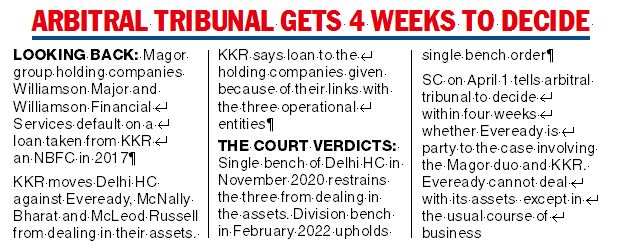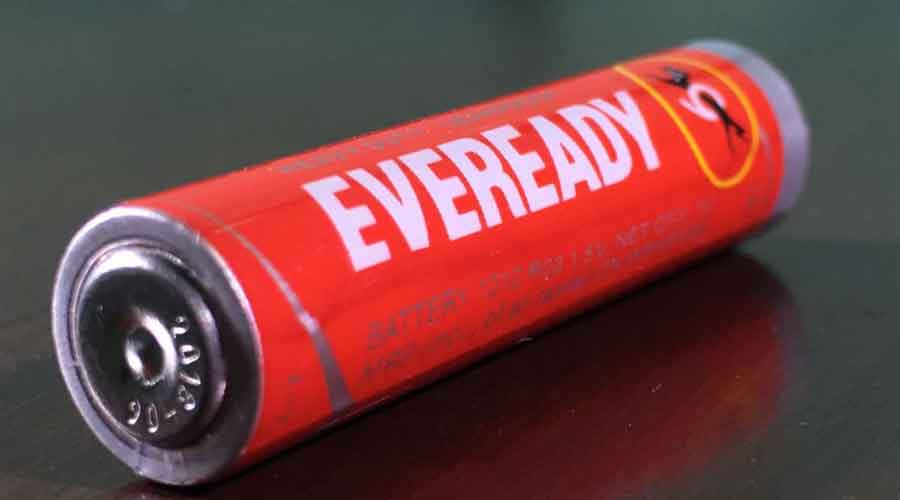The Supreme Court has asked the arbitral tribunal of the International Chamber of Commerce to decide within four weeks whether Eveready Industries ought to be sucked into an arbitration battle between the Williamson Magor group companies and KKR India Financial Services over a Rs 200-crore loan that the Khaitans failed to pay back.
An apex court bench comprising Justices Indira Banerjee and A. S. Bopanna also ordered Eveready not to dissipate or dispose of its assets, except in the usual course of business.
“The petitioner is restrained from creating any encumbrances of its unencumbered assets for a period of four weeks or till further orders of the arbitral tribunal, whichever is earlier,” the bench said in a recent order.
The arbitration dispute arises from a suit filed by KKR India against Williamson Magor & Co Ltd and Williamson Financial Services Ltd, the two holding companies of the Group, after they defaulted on the loan that was taken in 2017.
The battery maker has no connection with the loan and the only reason why it finds itself mired in the dispute is because both the single bench and the division bench of the Delhi high court have upheld KKR India’s contention that the loan had been extended to the holding companies of the WM Group – which have no assets of their own – due to their links with the operational entities and the assets that they possessed.
In fact, the loan documents refer to Eveready Industries India Ltd, McLeod Russel India Ltd, and McNally Bharat Engineering & Co Ltd as “reference entities”.
Even though Eveready was not party to the agreement with KKR, the non-banking finance company had moved the Delhi High Court invoking section 9 of the Arbitration and Conciliation Act to restrain the battery maker and the two other entities of the WM group from dealing in their assets.
The Khaitans have been trying to ringfence these entities from the legal kerfuffle over the disputed loan without much luck.

Back in February, the division bench of the Delhi high court upheld an injunction restraining the three Magor group entities from encumbering their assets in any manner. The bench also slapped a cost of Rs 2 lakh on each of these entities.
The single bench of the Delhi high court had restrained the company from selling or assigning assets or creating a charge on them. Moreover, it barred Eveready from carrying out any change in its capital structure, or resorting to any corporate or debt restructuring. The division bench declined to interfere with the single bench judgment.
Piquant problem
The legal tangle poses a piquant problem for Eveready which is now being proposed to be brought under the management control of the Barman family of Dabur.
Early last month, the Burmans asserted their right to be recognised as the promoters of the battery maker on the basis of their 19.84 per cent stake in Eveready, dwarfing the uncle-nephew duo of Aditya and Amritanshu Khaitan who together hold a mere 4.84 per cent.
The Khaitans have since moved out of the firm and the Burmans intend to acquire another 26 per cent through an open offer that is expected to open on April 26.
A source in the company said the Supreme Court order extends a major relief to the company as it can now carry out regular business, which may include creating a charge on assets in the usual course. Moreover, the apex court also did not clamp down specifically on a change in its capital structure.
The top court also asked the tribunal to decide on the jurisdiction without being influenced by any observations made by the division bench or the single bench.
In a communication to the bourses, Eveready said it continues to oppose the orders of injunction on various legal grounds. It maintains that it cannot become party to any legal proceedings as it was not a party to any loan agreement or involved in any arrangement relating to the pay back of the loan amount.
The arbitration over the disputed loan default has yet to start. It now appears the tribunal has to first decide whether Eveready can be part of the arbitration process.











